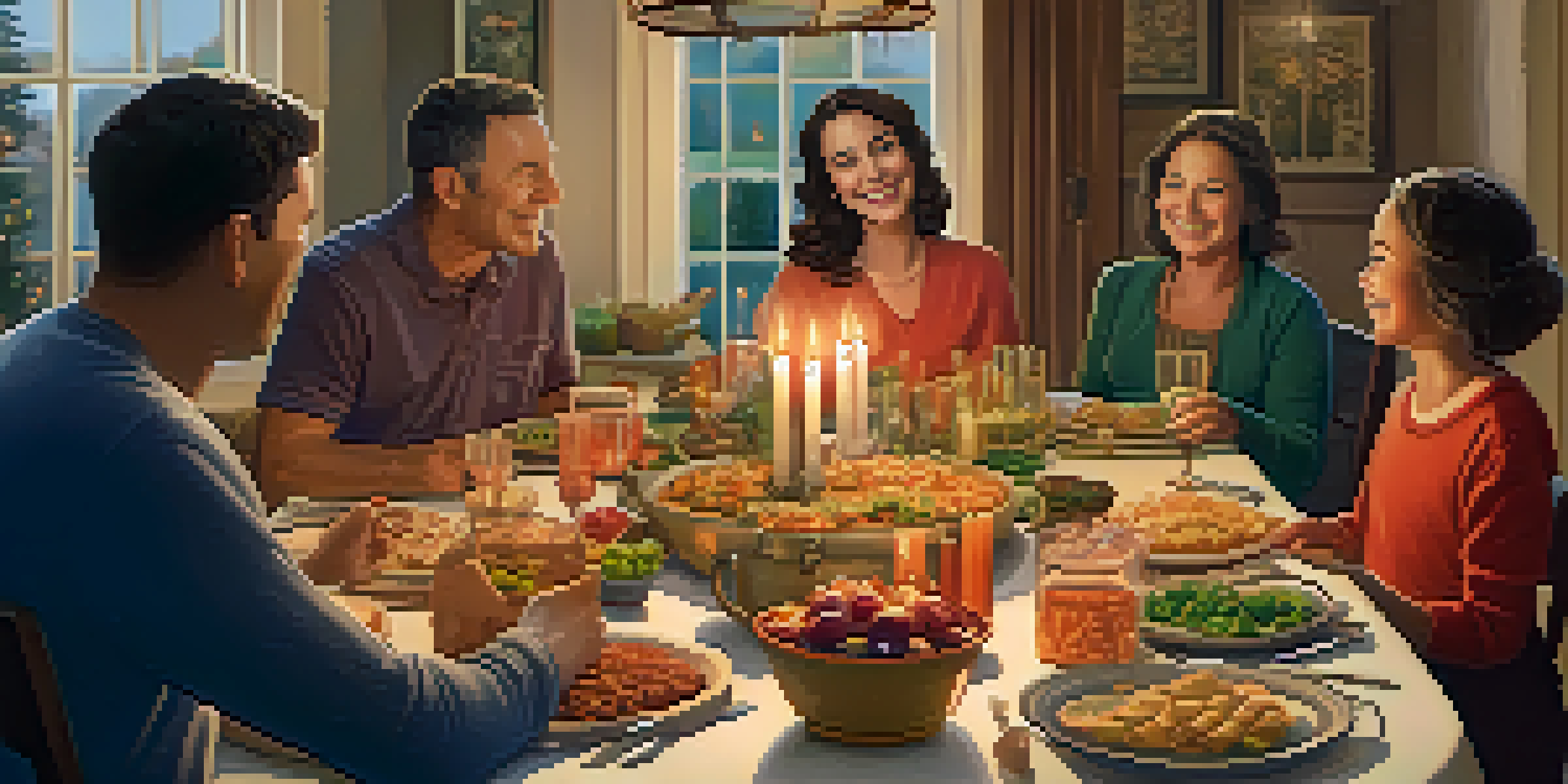Family Rituals: Their Spiritual Significance and Impact

Understanding Family Rituals and Their Importance
Family rituals are meaningful practices that families engage in together, shaping their identity and values. These can range from daily meals to annual traditions, providing a sense of belonging and continuity. They often serve as a thread that connects generations, passing down beliefs and customs that define a family.
Family is not an important thing, it's everything.
Rituals create an environment where family members can bond, communicate, and share experiences. Whether it's a simple game night or a yearly vacation, these moments foster connection and strengthen relationships. In a world that often feels chaotic, family rituals offer a reliable anchor.
Moreover, rituals can promote emotional health by creating a safe space for expressing feelings. They provide a structure for families to celebrate achievements, navigate challenges, and support one another through life's ups and downs.
The Spiritual Significance of Family Rituals
Spirituality often intersects with family rituals, enriching the experience for all involved. Many families incorporate spiritual practices, such as prayer or meditation, which can deepen their connection to one another and to something greater than themselves. These rituals can help instill values of gratitude, love, and compassion.

For instance, lighting a candle before a family meal can symbolize the presence of a higher power, inviting blessings and mindfulness into the gathering. Such acts can transform a simple meal into a sacred experience, reminding everyone of their shared beliefs and purpose.
Family Rituals Foster Connection
Engaging in family rituals creates a sense of belonging and strengthens emotional bonds among members.
Engaging in spiritual rituals together can also create a sense of unity and purpose. When families come together for spiritual practices, they cultivate a shared understanding of their beliefs, strengthening their bond and enhancing their collective identity.
Family Traditions: Celebrating Milestones Together
Celebrating milestones through family traditions can have profound effects on emotional well-being. Events like birthdays, anniversaries, and holidays often serve as focal points for family gatherings, allowing members to come together in joy and reflection. These rituals help families mark important life events, reinforcing their shared history and values.
The love of a family is life's greatest blessing.
For example, the tradition of creating a scrapbook for each child's birthday can become a cherished ritual that not only celebrates the child but also documents family memories over the years. This practice not only enhances the child's sense of belonging but also strengthens the family's narrative.
Moreover, such celebrations can create lasting memories that family members carry with them into adulthood. These shared experiences can serve as a touchstone during difficult times, reminding everyone of the love and support that exists within the family unit.
Rituals for Coping: Navigating Difficult Times
Family rituals can be particularly valuable during challenging times, providing a framework for coping with loss, change, or stress. Engaging in familiar practices can offer comfort and stability when the world feels unpredictable. For example, gathering for a weekly family dinner can become a refuge amidst chaos.
During periods of grief, families may create new rituals to honor loved ones, such as lighting a candle in remembrance or sharing stories. These actions not only help in processing emotions but also foster a sense of connection to those who have passed.
Rituals Provide Stability in Chaos
During challenging times, familiar rituals offer comfort and a framework for coping with stress and loss.
In essence, rituals can act as a lifeline, reminding family members of their shared strength and resilience. They can provide a sense of normalcy, encouraging families to lean on one another during difficult transitions.
The Role of Daily Rituals in Family Life
Daily rituals, no matter how small, can significantly impact family dynamics. Simple practices, like morning hugs or bedtime stories, can create a rhythm that fosters connection and love. These rituals help family members feel seen and valued, enhancing their emotional bonds.
Moreover, regular rituals can instill a sense of predictability and security in children's lives. For instance, a nightly routine of discussing the day's highs and lows can open lines of communication and strengthen trust among family members.
Ultimately, these daily rituals help cultivate a nurturing environment where everyone feels supported. They remind families that love and connection can be found in the simplest of moments.
Rituals Across Cultures: Diverse Practices and Beliefs
Family rituals vary widely across cultures, reflecting unique beliefs, values, and histories. For example, in many cultures, communal feasts during holidays are significant, serving not just to celebrate but also to reinforce community bonds. These gatherings highlight the importance of sharing and togetherness, transcending individual experiences.
Similarly, rituals like quinceañeras in Latin American cultures or bar mitzvahs in Jewish traditions signify important transitions, celebrating the coming of age in a vibrant and meaningful way. These events often involve the whole family, emphasizing the collective aspect of individual milestones.
Cultural Diversity in Family Practices
Family rituals vary across cultures, reflecting unique values while serving the universal purpose of fostering connection.
Understanding these diverse practices enriches our appreciation for the role of rituals in family life. They remind us that, while rituals may differ, their underlying purpose of fostering connection remains universal.
Creating Your Own Family Rituals: A Step-by-Step Guide
Creating meaningful family rituals doesn't have to be complicated; it can start with simple ideas that resonate with your family's values. Consider what activities everyone enjoys and how you can incorporate them regularly. This could be as simple as a weekly movie night or a monthly family hike.
Next, establish a consistent time for your ritual to help it become a part of your routine. Consistency is key to making these practices feel special and anticipated. Over time, these rituals will grow in significance as they become treasured family traditions.

Lastly, be open to evolving your rituals as your family grows and changes. The most important aspect is that these practices bring joy and connection, adapting to meet the needs of your family members over time.